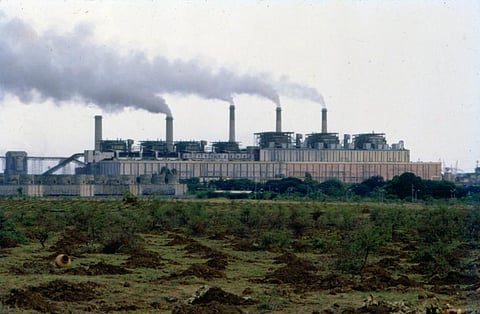Task force, flying squads are fine, but what does Delhi’s air really need
The Commission for Air Quality Management in the National Capital Region (NCR) and adjoining areas December 2, 2021 mandated an Emergency Task Force to rein in pollution in Delhi.
The Capital’s air remained the most polluted in India, with the air quality index at 429. Neighbouring Faridabad and Manesar (in Haryana) also scored similarly worrying 428 and 413 respectively.
The commission also sought flying squads to bring defaulters to book.
Section 12 of the Commission for Air Quality Management (CAQM) in NCR and Adjoining Areas Act 2021 mandates industries not running on piped natural gas or cleaner fuels shall be allowed to operate only up to eight hours a day Monday-Friday. They shall not be allowed to operate Saturdays and Sundays.
The step is appreciable. But a large number of industries in the region are yet to shift to cleaner fuel despite being given sufficient time. We now need policy for shutting down such industries running on dirty fuel.
A majority of industries have not switched to cleaner fuel, the Centre for Science and Environment (CSE) found in a study of industrial hotspots in districts Alwar, Bhiwadi, Sonipat, Panipat, Faridabad, Gurgaon and Ghaziabad. The Delhi-based non-profit found that coal remained the most consumed fuel in these districts.
Industries in those seven districts near the national Capital consumed around 1.41 million tonnes coal annually but only 0.22 tonnes natural gas.
The lack of an integrated and robust industrial fuel policy was a major reason for the reluctance to switch to cleaner fuels.
The Delhi Pollution Control Committee in 2018 notified the use of petrol, diesel, liquefied petroleum gas, natural gas, aviation turbine fuel, biogas and refused derived fuel (only for waste energy plants).
The list indicates careful choice; popular fuel like coal and agriculture-based waste were not approved, unlike in neighbouring states. So, while coal is off limits in Delhi, its use is approved in neighbouring Haryana and Rajasthan.
Delhi is geographically small. Banning coal in Delhi will not work unless the ban is extended to the whole NCR. Several legal and illegal industries in the city’s vicinity, but in neighbouring states, emit and pollute the air within the National Capital Territory (NCT).
This makes it essential to look deeper into existing fuel policy and devise a common fuel policy for Delhi NCR to include cleaner fuel. A comprehensive industrial fuel policy needs to be developed to address significant issues related to implementation of cleaner fuel for industries.
“Coal based power plants are noticeably a major cause of pollution in NCT. Focus is needed on small-scale industries, dependent on dirty fuel, that operate in NCR without installing air pollution-control devices (APCD) and contributing to pollution,” added Nivit Kumar Yadav, industrial pollution team director at CSE.
Illegal industries using dirty fuel operate in several parts of the NCT (Shiv Vihar, Mustafabad, etc). Illegal units have also been detected in recognised industrial areas, including Anand Parbat, Naraina, Okhla, New Mandoli, Wazirpur and others.
Most industries in such areas are small-scale, without APCD and operating on dirty fuel. Their presence is a catalyst for illegal supply of coal within the Capital. Steps should be taken against illegal industries in Delhi NCR.
Initiatives needed
- Coal needs to be dropped off the list of approved fuels, especially in NCR states
- Gas should be made available in such states, facilitating industries’ switch to cleaner fuel
- Such switch should be offered incentives and subsidies
- A comprehensive industrial fuel policy — including the role of multiple stakeholders like industrial development authorities (responsible for facilitating the infrastructure), Petroleum and Natural Gas Regulatory Board, gas companies, industrial associations and pollution control boards


